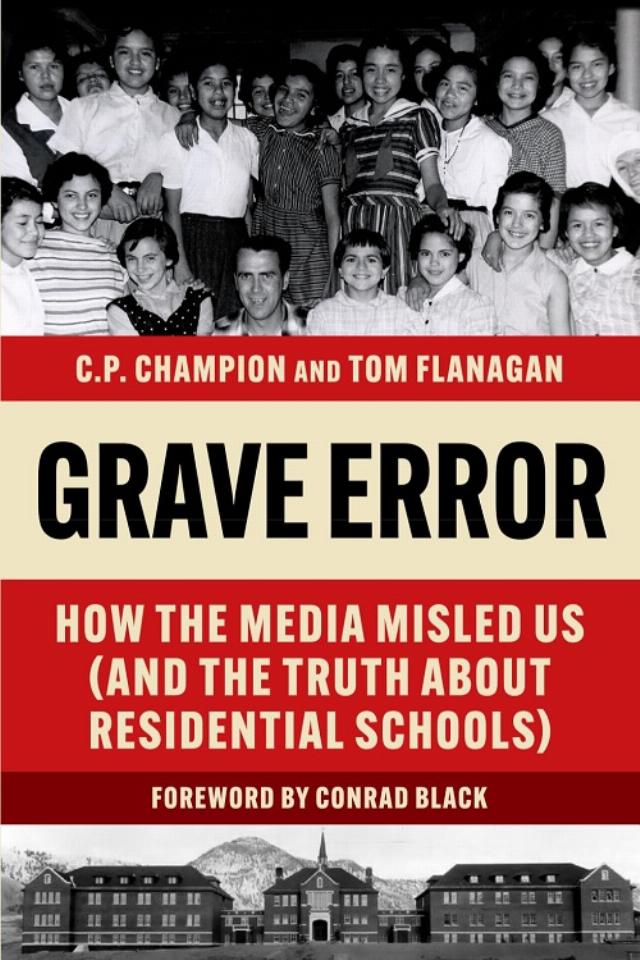Censorship in B.C.
The Quesnel, British Columbia city council's censorious response to the revealing, well researched, and well documented book, Grave Error: How the Media Misled Us And the Truth About Residential Schools (editors Tom Flanagan and Chris Champion, 2023) is, sadly enough, more grist for the woke mill. Cancel culture is running amok throughout the West and Quesnel (Pronounced Quinn-L) is merely its microcosm.
The book is a collection of essays by academics, journalists, and others debunking claims that First Nations children went missing (victims of foul play by staff) while attending Canada's former -- often church-run -- Indian Residential Schools and/or were buried in unmarked graves on the property of those schools, which existed in the  late 19th and much of the 20th century, with the last one being shuttered in the 1970s. For the record, none of these alleged unmarked graves have been discovered, nor have there been any missing children, although some, to quote Tom Flanagan, one of the book's editors, "may have been forgotten by their relatives."
late 19th and much of the 20th century, with the last one being shuttered in the 1970s. For the record, none of these alleged unmarked graves have been discovered, nor have there been any missing children, although some, to quote Tom Flanagan, one of the book's editors, "may have been forgotten by their relatives."
Nevertheless, fireworks flew when Pat Morton, wife of Quesnel mayor, Tony Paull, read Grave Error, liked it, and purchased ten copies for those she thought would be interested. One of the recipients was the mother of a Metis (mixed French and First Nations ancestry) city councilor, Tony Goulet. He, along with the local Lhtako Dene Nation, attended the March 19th council meeting to accuse Morton and the book of "hate" and "denialism." Other First Nations groups subsequently piled on. As is typical these days, all council members, including Mayor Paull, voted to denounce the book, although Paull, to his credit, has, at least to date, not caved to demands he resign as mayor. And to once more quote Tom Flanagan: "[y]ou would think city council would have better things to do than to tell citizens what not to read."
Censorship attempts pose several problems. If someone reads a book and disapproves of it for whatever reason, he might demand that it be removed from the shelves. But here you have an individual elevating himself above the masses. It's apparently okay for him to read the book, but not okay for anyone else. What gives him the right to assume that? Is he somehow superior? Why should he deny others something he can freely access?
Other would-be censors have never read the book and rely on hearsay. Not a good idea. If they have never read the book, they have no accurate idea what is in it and are not qualified to pass judgment. They certainly have no right to demand that it be censored.
Additionally, censoring speech, whether verbal or written, is wrong because it deprives us of our most basic freedom. Wiser souls than I have maintained that if we lose all our freedoms except free speech, we still have a chance to employ argument to win them back. But without freedom of speech, we lose our means of peacefully defending and reinstating all of these additional freedoms.
Finally, there are literally millions of books, magazines, periodicals, newspapers, etc. in circulation. We only have a limited amount of time to read them all. If something appears interesting and enjoyable, and you have the time, by all means read it. If something appears uninteresting or upsetting, the solution is simple. Don't read it (or read it, dissect it, and construct a counterargument). Time might be better spent with something more enjoyable or interesting. Bottom line: leave the rest of us alone.
FOLLOW US ON
Recent Articles
- Not in Kansas Any More
- Democrats Dying on the Most Desolate Hills
- If She’s an Astronaut … I’m a Jet Fighter Pilot
- Is the Jihadist Trojan Horse Winning?
- Who Has the Best American Autobiography?
- This Easter, Let Us Renew Our Faith
- Is it Time to Ignore the Judiciary?
- Higher Ed is Fighting Back!
- Easter: the Resurrection of Jesus Transformed the World Forever
- Trump’s vision for technological greatness
Blog Posts
- Hillary ‘the Russia Hoaxer’ Clinton wants to imprison people for ‘propaganda’
- Rep. Jamie Raskin threatens foreign leaders who cooperate with President Trump with repercussions, 'when we come back to power — and we will'
- Maybe we need more living versions of “Hillbilly Funerals”
- A female fencer's courage is partly rewarded
- Democrats' Cloward-Piven default
- A New Mexico judge resigned over allegations that he kept a Tren de Aragua member in his home
- The Pope’s death is leading to yet more anti-Israel and anti-Trump propaganda
- Ivy League college invites antisemitic rapper onto campus
- Pope Francis, RIP
- It’s not really about Abrego Garcia
- When Oregon became Bart Jason
- Post-election lawfare; legislating from the bench
- Oregon pushes trans track
- The Starliner: worse than we thought
- Professional sports leagues push gun control






